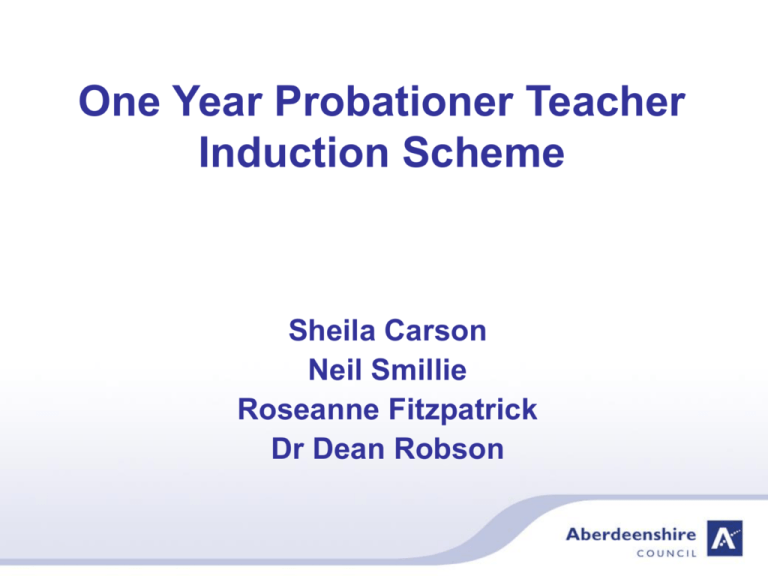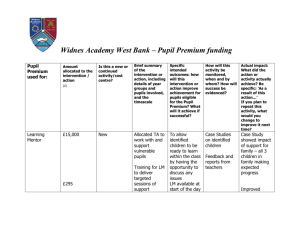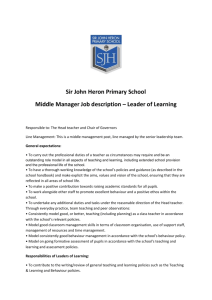What is Research?
advertisement

One Year Probationer Teacher Induction Scheme Sheila Carson Neil Smillie Roseanne Fitzpatrick Dr Dean Robson Learning Conversations In groups of 3-4 discuss: • CPD – what’s working? • Emerging issues Record on template provided Interim Profiles • Essential elements • Trail of evidence • Submitting your profile • What happens next? Classroom-based Practitioner Enquiry Small–scale Research Dr Dean Robson d.robson@abdn.ac.uk School of Education, University of Aberdeen What is Research? “Action research is an investigation, based on observation of and reflection on current practice, where the ‘researcher’ focuses on a ‘problem’, draws on relevant literature, then plans, implements and evaluates actions designed to improve pupils’ learning” [W. Humes, Research Professor, UWS] Views from GTCS “The ultimate aim of teacher research is to make a difference to pupils’ learning and experiences” [M. MacIver, Chief Executive/Registrar] “This (research) process is now recognised through the incorporation of research skills into all of the GTCS standards” [I. Matheson, Educational Planning and Research Officer] Teacher Research Outcomes • Creation of new understandings about teaching and learning and about learning environments • Development and critique of practice and curriculum • Improvement of practice in teaching and learning • Tools for reflection and evaluation • Pupil learning gains • Creation of new knowledge for the profession • Opportunity for learning via collaboration/sharing Importance • GTCS recognition of importance of teacher research • Standards and Professional Recognition Frameworks (SITE, SFR, etc) • Continuing Professional Learning & Development - Pathways • New Professional Identity, e.g. STNE (investigators and co-investigators of learning, critical thinkers, reflective / reflexive practitioners) SFR • Benchmark 1.3.2 Have knowledge of how to access and relate research knowledge to their teaching circumstances Can discuss critically how systematic investigation of, and reflection on, classroom practice can inform and develop teaching and learning • Benchmark 2.4.1 Ensure research literature is critically reviewed in relation to understanding and developing practice Research links to aspects of all of the main categories of the SFR: • Professional Knowledge & Understanding (e.g. knowledge of new curricular developments) • Professional Skills and Abilities (e.g. planning, communication) • Professional Values and Personal Commitment (e.g. self-evaluation, partnerships) Induction Year Research (D&G Scheme) • Dumfries and Galloway Probationer Research http://www.dumgal.gov.uk/Dumgal/xdoc uments/15771.pdf.ashx Relationship between Research, Policy and Practice (From :Baumfield, Hall & Wall (2008) p3) Action Research • “Collaborative, educational action research is often small scale intervention in the functioning of education and is a close examination of the effects of such intervention. Small can be beautiful. The “objects” of educational action research are educational practices and the method is based on the notion of a spiral of self-reflection. A spiral of cycles of planning, acting, observing and reflecting. It encourages teachers to be aware of their own practice, to be critical of that practice and to be prepared to change it.” [Stenhouse (1980)] Action Research Cycle Teachers as Learners • • • • Teacher Enquiry Use body of knowledge about T&L Unrecognised innovators and problem-solvers Knowledge of curriculum & good practice, adapted to fit personal and professional environment • Intuitive – fits resource and timing limits – develop and deploy expertise • Reflection and self-evaluation – tendency towards single cycle enquiry • AR: ideally a series of linked enquiries Action Research Cycles • Fits the PLAN – DO – REVIEW model underpinning teachers practice. [Model adopting :Lewin (1952), Carr and Kemmis (1986)] Some Quotes “The nature of action research blends with effective CPD and classroom and school-based action research is recognised as a major means of professional growth for teachers” Cameron-Jones (1983). “What constitutes the relevance of research, for instance, depends to a large extent on what questions are being asked, in what context, and for what practical ends.” Davies (1999) “…the uniqueness of each classroom setting implies that any proposal needs to be tested and verified and adapted by each teacher in her or his own classroom.” McIntyre (2005) “The evidence indicates how teachers’ involvement and confidence can be built in expansive learning environments characterised by specialist support, collaborative working, and the development of mutual trust.” Brown (2005) Starting Points for Research • • • • • • • • • I would like to improve…. I want to change….because… I am perplexed by…. Some people are unhappy about…. I want to learn more about…. An idea I would like to try out in my class is…. I think….would really make a difference to…. Something I would like to do is to change…. I’m particularly interested in…. Research Process AREA / TOPIC OF INTEREST LITERATURE & OTHER SOURCES IMPLEMENT RESEARCH ANALYSIS / EVALUATION / REFLECTION A R CYCLE FOCUSSED RESEARCH QUESTIONS DESIGN (METHODS, ETHICS, RESOURCES) Research Process (Stage 1) • Analysis of current practice • Identification of focus for research (with designated supporter?) • Review of existing research • Formulation of research question/ hypothesis • Development of an action plan (including ethical considerations) Research Process (Stage 2) • Implement action plan • Assessment/monitoring of effects – identify main, evidenced findings • Conclusions/explanations • Evaluation of process • Recommendations for further research Focus on Pupil Learning? • Curriculum for Excellence may provide a starter frame • 4 capacities (CI, SL, RC, EC) • But how do you ‘measure’ e.g. confidence? • Need to break down to measurable bits – such as independent working, self-esteem, making choices • Distinguishing social, cognitive, affective attributes Gathering Evidence • • • • • • • • Observation Audio/video Interviews Field notes Photographs Questionnaires Student work Logs/diaries TRIANGULATION Observation of interactions Children's’ engagemen t during science Analysis of Children's’ work Interview with children Evidence Comparison Quantitative Qualitative Learners’ Attainment Test scores Teachers’ marks Examples of work Interviews Logs/diaries Examples of work Learners’ Attitudes Questionnaire Survey Observation/video Interviews Logs/diaries Observation/video Input /Output Model INPUT CLASSROOM ‘SYSTEM’ OUTPUT Other teaching techniques Peer Assessment Child’s beliefs rethemselves as learners Children’s behaviour LITERACY CLASSROOM (Example 1 next slide) Boys Attainment in Writing Teacher confidence Research Questions and Potential Outputs Question Output 1 Output 2 Output 3 Will boys’ attainment in writing (as assessed using teacher assessments) improve after using peer assessment? Boys’ writing: 1.Work samples marked by teacher 2. Pupils’ self assessments 3. Test results Whole class behaviour: 1. Behaviour log 2. Video Teacher confidence: 1. Self-critique via learning log 2. Interview Does the use of visual cues support the improvement of behaviour for pupils with ASD disorders in whole class sessions Behaviour of ASD pupils: 1. Behaviour log 2. Observations 3. Video Achievement of ASD pupils: 1. Work samples 2. Achievement log 3. Parental interview Parental attitudes: 1. Questionnaire 2. Parenting log Will using more open questions in class discussions improve the on-task behaviour of all pupils? On-task behaviour: 1. Observations 2. Class rewards system 3. Pupil self assessment Length of pupil contributions: 1. Observations 2. video Pupils’ work ethic: 1. Test results 2. Teacher assessment 3. Homework return rates (Adapted from: Baumfield, Hall & Wall (2008) p19) Research Resources • Starting Points for Research in Schools document [available at http://www.sera.ac.uk] • Ethical guidelines [available at http://www.sera.ac.uk] • Research databases • Focussed websites Databases • Scottish Educational Research Database SERD at Scottish Education Research Database (http://www.scotland.gov.uk/Topics/Research/Resear ch/14478/SERD) • Current Educational Research in the UK CERUK at http://www.ceruk.ac.uk • Education Line (Conference/published papers) at http://www.leeds.ac.uk/educol • Department for Education and Skills (DfES) at http://www.dfes.gov.uk/research • Educational Resources Information Center (ERIC) at http://www.eric.ed.gov Focussed Websites • Research Informed Practice Site (TRIPS) at http://www.standards.dfes.gov.uk/research/ • Research of the Month (ROM) at http://www.gtce.org.uk/research/romtopics/ • Teacher researcher networking at http://www.teacherresearch.net Opportunities/Initiatives • RES+/FPS+ • Scottish Teachers for a New Era (STNE) – research and development project – funding for Action Research Link (www.abdn.ac.uk/stne) • Applied Educational Research Scheme (AERS) – networks Link (www.aers.ac.uk) • GTCS Teacher Researcher Programme – funding Link (www.gtcs.org.uk) • Scottish Educational Research Association (SERA) – annual conference • Local Authority Research networks • SEED Opportunities Education Sponsored Research (http://www.scotland.gov.uk/Topics/Research/Research/14478/Sponsored Research (Aberdeen University - Advanced Professional Studies) STNE AR Scholarship Titles • • • • • • • • • • • • • Role of video in developing Maths Recovery strategies. Pupil-led course development Investigating the effect on individual performance caused by an intervention intended to promote exploratory talk amongst primary 4/5 pupils in group problem-solving situations during maths lessons. Can a multi-modal approach improve the outcome for a disaffected S4 standard Grade Chemistry Class? ICT teaching and learning in the Primary 1 sector. Investigating the use of a techden to promote technological literacy in early years. Active learning approaches within P6/P7 mathematics. Impact of teacher continuity on pupil motivation. Investigating the impact of a new curriculum of Drama and Media Studies on S1/S2 pupils with regard to A Curriculum for Excellence. Teachers’ use of Personal Development Planning with Pupils. Exploring the factors responsible for effectiveness of a pragmatic model using alternative arts activities on vulnerable and ‘at-risk’ secondary school pupils Monitoring the children’s development of contributions due to the repetition of topics in preschool for a second year in a row. Investigation of the use of ICT to support pupils with cerebral palsy. Investigating children’s learning and development of literacy skills in a structured play area. Networking/QA Session • What’s working – current approaches • Looking to the future Partnership Developments • ‘Entry to Teaching Profession Profile’ evaluation via on-line survey (UofA – Dean Robson and Roseanne Fitzpatrick) • CPD survey (UofA – Rachel Shanks) • New Teachers’ Network www.abdn.ac.uk/newteachers • CPD Pathways – opportunities and your future plans Plenary/Evaluation







